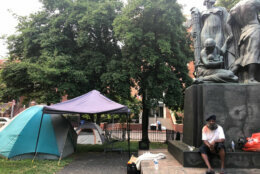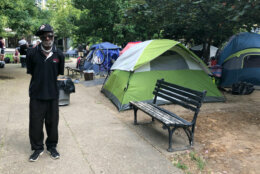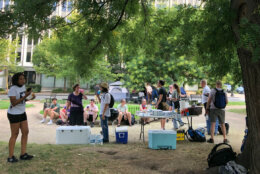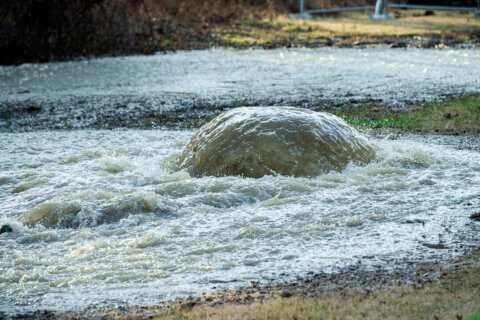





A neighborhood is divided over the future of homeless encampments at the intersection of 12th Street and Massachusetts Avenue in Northwest D.C.
In an anonymous letter to the National Park Service in late June, several Ward 2 residents asked officials to clear the encampments at Burke Park and Gompers Park immediately.
Citing concerns about increased crime and poor sanitation in the area, the letter urged U.S. Park Police to enforce the agency’s rules and prevent the encampments from coming back once vacated.
“[T]here is ample evidence that these encampments are a danger to the community,” the letter reads, “bringing with them excess refuse, human excrement and other bodily fluids, heated domestic disputes, drug abuse, and an inability to enjoy resources and green space under the jurisdiction of the National Park Service.”
Guidelines from the Centers for Disease Control and Prevention recommend that homeless residents should be allowed to remain where they are if permanent housing solutions aren’t available.
The writers of the letter acknowledged this, but said that they “believe the public health and safety danger caused by the encampments far outweighs any benefit of leaving them be.”
They also referred to the city’s reliance on the guidelines as a “crutch” to justify inaction.
“If these encampments were set up on the National Mall, there is no doubt they would be removed without hesitation or delay,” they wrote.
Brian Joyner, chief of staff of the National Mall and Memorial Parks, told the area’s leaders that he planned to clear the encampments after July 4.
The National Park Service said in a statement Friday that they have “no imminent plans to remove existing encampments.” While camping in D.C.’s national parks is prohibited, the Park Service has followed the health recommendations “and the District of Columbia’s practice of allowing encampments to remain on park land during the pandemic.”
They added, “We’ll take a social services-first approach and will continue to work closely with the Office of the Deputy Mayor for Health and Human Services and community partners to connect people living in encampments with resources and housing. Prior to taking any action that would affect people living in encampments we will give individuals ample notice.”
‘Despicable letter’
Not all Ward 2 residents agree with the letter.
Stephanie Myles, who lives in the Logan Circle neighborhood and is the co-founder of the D.C.-area grassroots organization The Palm Collective, which aims to end systemic racism, said she can’t ignore chronic homelessness in the parks, and that no one should.
“We should not be able to pass by our fellow neighbors and see them in such a condition and not want to change that,” she said. “This is not something that’s going to go away.”
Myles said she learned about the potential eviction through social media, triggering her and other community activists to mobilize to protect the unhoused residents.
“I just want our neighbors in Ward 2, especially those who wrote that despicable letter, to come to understand that they are not as far removed from the situation as they think they are,” she said.
Advisory Neighborhood Commissioner Alexandra Bailey is in charge of the region containing Burke Park. She said an eviction would not solve the problem of homelessness in the area.
“There’s only one real permanent solution,” Bailey said. “At the end of the day, whether they’re sleeping in Burke Park, on the ground next to Burke Park or 6 feet away across the street, the unhoused and vulnerable will still be with us, along with all of the consequences of that vulnerability.”
Bailey said she’s been trying for months to get all people without homes in the Burke encampment housing vouchers, but she needs more time.
She asked the National Park Service for a two-month extension to secure the necessary documentation, which she said the agency refused.
“I think 12th and Massachusetts is encapsulating the issue that’s going on in all of D.C.,” she said. “I think it really just shows that we need to massively improve this system.”
“These people are our responsibility,” Bailey said. “And if there is, as people have claimed, an increase in a lack of sanitation and/or crime, that’s on us because we’re not addressing this upstream.”
WTOP’s Dick Uliano and Rick Massimo contributed to this report.







